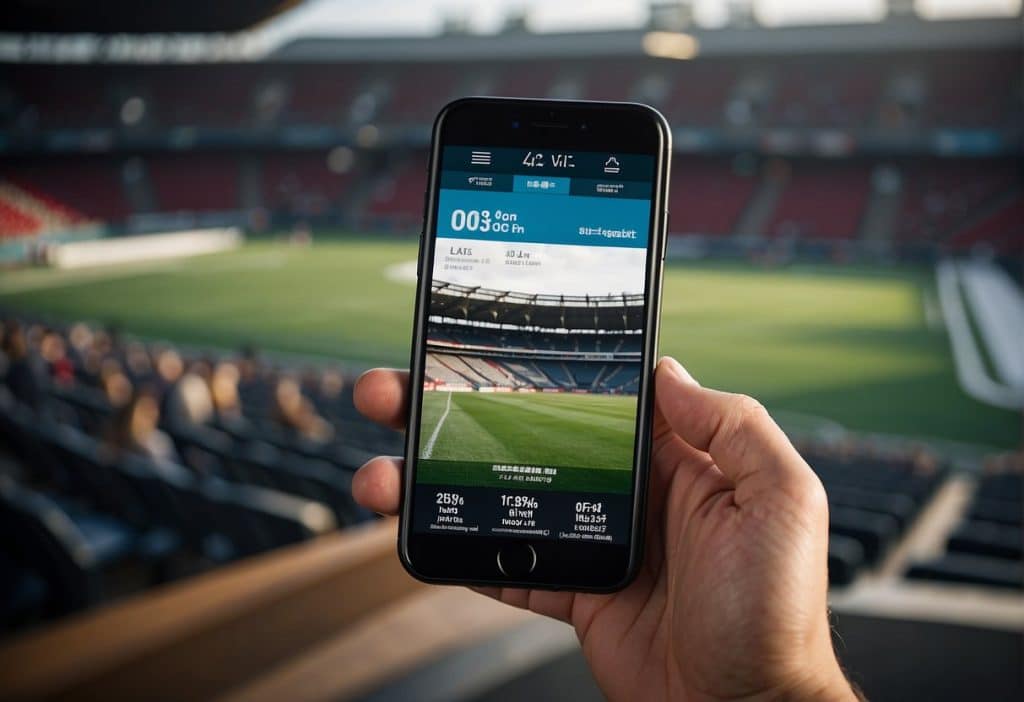If you’re an avid sports bettor, you may have come across restrictions that prevent you from accessing certain betting sites. This can be due to geographical location or government regulations. Fortunately, there’s a solution that can help you bypass these restrictions and gain access to the betting sites you want: a Virtual Private Network (VPN).
A VPN is a service that encrypts your internet connection and routes it through a server in a different location. This allows you to appear as if you’re accessing the internet from that location, giving you access to content that may be restricted in your actual location. When it comes to sports betting, using a VPN can help you access betting sites that are blocked in your country or region.
Using a VPN for sports betting can also provide an added layer of security and privacy. By encrypting your internet connection, a VPN can help protect your personal information and financial data from hackers and other online threats. Additionally, some betting sites may track your online activity and use it for targeted advertising or other purposes. Using a VPN can help prevent this by masking your IP address and keeping your activity private.
Key Takeaways
- A VPN can help you bypass restrictions and access sports betting sites that may be blocked in your location.
- Using a VPN for sports betting can provide added security and privacy by encrypting your internet connection and masking your IP address.
- When choosing a VPN for sports betting, consider factors such as speed, server locations, and security features.
Understanding VPNs and Sports Betting

What Is a VPN?
If you are someone who enjoys sports betting, you might be familiar with the concept of a VPN. A VPN, or Virtual Private Network, is a tool that allows you to connect to the internet through a private network. This means that your internet connection is encrypted and your IP address is hidden from the websites you visit. By using a VPN, you can change your IP address to a different location, making it appear as if you are accessing the internet from a different country.
Legality of Sports Betting Online
Sports betting is a popular pastime, but it is not legal in all parts of the world. In some countries, sports betting is completely legal and regulated, while in others it is illegal. If you live in a country where sports betting is illegal, using a VPN to access sports betting sites could be seen as breaking the law. It is important to check the laws in your country before using a VPN for sports betting.
When it comes to online sports betting, there are many risks involved. Your personal data and financial information could be at risk if you do not take the necessary precautions. This is where a VPN can be useful. By using a VPN, you can protect your data and privacy while accessing sports betting sites. The encryption provided by a VPN ensures that your internet connection is secure and your data is protected from prying eyes.
In summary, a VPN is a useful tool for sports bettors who want to protect their data and privacy while accessing sports betting sites. However, it is important to check the legality of sports betting in your country before using a VPN.
Choosing the Right VPN for Betting

If you’re looking to use a VPN for sports betting, it’s important to choose the right provider. Not all VPNs are created equal, and some may not be suitable for your needs. In this section, we’ll go over some factors to consider when choosing a VPN for betting, as well as some of the top providers to consider.
Factors to Consider
When choosing a VPN for sports betting, there are a few factors to keep in mind. Here are some key considerations:
- Reliability: You’ll want to choose a VPN provider that is reliable and has a good track record. Look for providers that have been around for a while and have a solid reputation.
- Security: Security is always a top concern when using a VPN. Look for providers that offer strong encryption and other security features.
- Speed: If you’re going to be betting on sports, you’ll want a VPN that is fast and doesn’t slow down your internet connection too much.
- Location: Depending on where you’re located, you may need a VPN that has servers in specific locations. For example, if you’re in the US and want to bet on European sports, you’ll need a VPN with servers in Europe.
Top VPN Providers for Sports Betting
Here are some of the best VPN providers to consider for sports betting:
- NordVPN: NordVPN is a popular choice for sports bettors, thanks to its fast speeds and large server network. With over 5,000 servers in 59 countries, you’ll have plenty of options for connecting to the internet securely and quickly.
- ExpressVPN: ExpressVPN is another top choice for sports bettors, thanks to its fast speeds and reliable service. With servers in over 90 countries, you’ll be able to connect to the internet from almost anywhere in the world.
- Surfshark: Surfshark is a newer VPN provider, but it’s quickly gaining popularity thanks to its fast speeds and affordable pricing. With servers in over 60 countries, it’s a great choice for sports bettors who want a reliable VPN without breaking the bank.
- CyberGhost: CyberGhost is a great choice for sports bettors who want a VPN that’s easy to use. With over 6,000 servers in 90 countries, you’ll have plenty of options for connecting to the internet securely and quickly.
When choosing a VPN for sports betting, it’s important to do your research and choose a provider that meets your needs. Consider factors like reliability, security, speed, and location, and choose a provider that offers the features you need at a price you can afford.
Setting Up Your VPN
When it comes to sports betting, using a VPN is a great way to ensure your online activities remain private and secure. Setting up your VPN is a relatively simple process that involves two main steps: installation and configuration, and connecting to the right server.
Installation and Configuration
The first step in setting up your VPN is to install and configure it on your device. This involves choosing a VPN service that meets your needs and downloading the appropriate software. Most VPN providers offer software for a range of devices, including desktop computers, laptops, smartphones, and tablets.
Once you have downloaded the software, you will need to configure it according to your preferences. This may involve selecting a server location, setting up automatic connection options, and customizing your security settings. Most VPN software comes with user-friendly interfaces that make it easy to configure your settings.
Connecting to the Right Server
The next step in setting up your VPN is to connect to the right server. This is important because the server location can affect the speed and reliability of your internet connection, as well as your ability to unblock sports betting sites and services.
When choosing a server location, it is important to consider your internet connection speed and the location of the sports betting site or service you want to access. For example, if you are located in the UK and want to access a sports betting site that is only available in the US, you will need to connect to a US server location.
Overall, setting up your VPN for sports betting involves choosing a VPN service that meets your needs, configuring the software according to your preferences, and connecting to the right server location. By following these steps, you can ensure your online activities remain private and secure while enjoying the benefits of sports betting.
Accessing Betting Sites with a VPN
If you are looking to access sports betting sites that are not available in your region, using a VPN is a viable solution. VPNs help you bypass geo-restrictions and access blocked content, making it possible for you to gamble on sports events from anywhere in the world. However, it is important to note that not all VPNs are created equal.
Unblocking Geo-Restricted Content
When choosing a VPN for sports betting, it is crucial to look for one that has a large server network. A VPN with a wide range of servers in different countries can help you access geo-restricted content, such as gambling sites that are not available in your region. Additionally, you should look for a VPN that offers fast connection speeds and unlimited bandwidth to ensure a smooth and seamless betting experience.
Maintaining a Stable Connection
Another important factor to consider when using a VPN for sports betting is the stability of your connection. A stable connection is essential to ensure that your bets are placed correctly and that you do not experience any lag or delays. To maintain a stable connection, choose a VPN that has a reliable server network and offers dedicated IP addresses. Dedicated IP addresses ensure that your connection is not shared with other users, which can help prevent connection drops and improve overall stability.
In summary, using a VPN to access sports betting sites is a great way to bypass geo-restrictions and gamble on your favorite sports events from anywhere in the world. When choosing a VPN for sports betting, look for one with a large server network, fast connection speeds, unlimited bandwidth, and dedicated IP addresses to ensure a smooth and stable betting experience.
Security and Privacy Considerations
When it comes to sports betting, security and privacy are paramount. Using a VPN service can help you ensure both. Here are some considerations to keep in mind:
Ensuring Anonymity and Safety
A VPN service encrypts your online activities, making it difficult for anyone to intercept or monitor your internet traffic. This added layer of security protects sensitive information from potential cyber threats. By masking your IP address with a VPN, you can bet on sports platforms without revealing your true location.
When choosing a VPN service, look for one that offers military-grade encryption and a no-logs policy. A kill switch is another important feature to consider. This will automatically disconnect your internet connection if the VPN connection drops, ensuring that your online activities remain private.
Avoiding Data Leaks
One potential risk of using a VPN for sports betting is that your DNS requests can leak outside of the encrypted VPN tunnel. This can reveal your true location and make it possible for others to track your online activities. To avoid this, look for a VPN service that offers DNS leak protection.
Another potential risk is that your VPN provider could be logging your online activities. To avoid this, look for a VPN provider with a strict no-logs policy. This means that they do not keep any records of your online activities, ensuring that your privacy is protected.
In summary, using a VPN service for sports betting can help you ensure your anonymity and safety while protecting your sensitive information from potential cyber threats. When choosing a VPN service, look for one that offers military-grade encryption, a no-logs policy, a kill switch, and DNS leak protection.
Maximizing Betting Opportunities
If you’re a sports bettor, you know that the more opportunities you have to place bets, the better your chances of winning. One way to increase your betting opportunities is by using a VPN to unblock sportsbooks that may be restricted in your country. Here are some ways to maximize your betting opportunities:
Exploring International Sportsbooks
With a VPN, you can access sportsbooks from all over the world. For example, Bet365, DraftKings, Betfair, 888Sport, and William Hill are all popular sportsbooks that you may not be able to access from your country without a VPN. By using a VPN, you can explore these sportsbooks and find opportunities to place bets on sports that may not be available in your country.
Taking Advantage of Different Odds
Different sportsbooks offer different odds for the same event. By using a VPN to access sportsbooks from different countries, you can compare the odds offered by each sportsbook and choose the one that offers the best odds for the bet you want to place. This can increase your chances of winning and maximize your potential payout.
To make the most of your VPN, it’s important to choose a reliable provider that offers fast speeds and reliable connections. You should also be aware of the laws in your country regarding sports betting and VPN usage. By following these tips, you can maximize your betting opportunities and increase your chances of winning your sports bets.
Financial Transactions and VPN
When it comes to sports betting, financial transactions are a crucial aspect of the process. You want to ensure that your deposits and withdrawals are safe and secure. Using a VPN can help you achieve this goal.
Safe Deposits and Withdrawals
One of the main advantages of using a VPN for sports betting is the added layer of security it provides. When you connect to a VPN, your online activity is encrypted, which means that your financial information is protected from prying eyes. This is especially important when you are making deposits or withdrawals from a betting site.
In addition to encryption, many VPNs offer other security features, such as malware protection and ad-blocking. These features can help protect you from online threats and ensure that your transactions are safe and secure.
Currency and Payment Options
Another benefit of using a VPN for sports betting is the ability to access sites that may not be available in your region. This can be especially useful if you want to bet on a sport that is not popular in your country.
When using a VPN, you can connect to a server in a different country and access betting sites that are not available in your region. This can give you access to a wider range of sports and betting options.
In addition, some betting sites may only accept certain currencies or payment options. By using a VPN, you can connect to a server in a country where your preferred currency or payment option is accepted.
Overall, using a VPN for sports betting can help ensure that your financial transactions are safe and secure. With features such as encryption and access to different currencies and payment options, a VPN can help you get the most out of your sports betting experience.
VPN Performance and Speed
When it comes to sports betting, speed is crucial. You want to be able to place your bets quickly and efficiently, without any lag or delay. This is where VPN performance and speed come into play.
Evaluating VPN Speeds for Betting
The speed of your VPN can be affected by a number of factors, including the distance between your device and the VPN server, the number of simultaneous connections, and the amount of internet traffic on the server.
To evaluate VPN speeds for sports betting, you should consider the following:
- Server location: The closer the server is to your location, the faster your connection will be. Choose a VPN with servers in locations that are close to the sports betting sites you use.
- Simultaneous connections: If you plan on using multiple devices to place bets, you’ll want a VPN that allows for multiple simultaneous connections.
- Internet traffic: Some VPNs have high levels of internet traffic, which can slow down your connection. Look for a VPN that has low traffic levels and high bandwidth.
Reducing Latency for Live Betting
If you enjoy live betting, you’ll want to minimize latency as much as possible. Latency is the delay between when you place a bet and when it is accepted by the sportsbook. The longer the latency, the more likely it is that the odds will change before your bet is accepted.
To reduce latency for live betting, you should consider the following:
- Server location: Choose a VPN server that is as close as possible to the sportsbook’s server. This will help minimize latency.
- VPN protocol: Some VPN protocols are faster than others. Look for a VPN that uses a fast protocol, such as WireGuard or Lightway.
- VPN provider: Choose a reputable VPN provider that has a proven track record of fast and reliable connections.
Overall, VPN performance and speed are important factors to consider when it comes to sports betting. By choosing the right VPN provider and server location, you can ensure that your connection is fast and reliable, allowing you to place your bets quickly and efficiently.
Mobile Betting with VPN
If you are a sports betting enthusiast, you must have heard about the benefits of using a VPN to access mobile betting sites. With a VPN, you can bypass geo-restrictions and access betting sites that are not available in your region. In this section, we will discuss the best VPNs for mobile devices and the compatibility of mobile betting sites with VPNs.
Best VPNs for Mobile Devices
When it comes to using a VPN for sports betting on mobile devices, you need a VPN that is fast, reliable, and secure. Some of the best VPNs for mobile devices include:
- ExpressVPN: This VPN is ideal for sports betting with a fast Lightway protocol and obfuscated servers. It has military-grade encryption and offers excellent customer support.
- CyberGhost: This VPN has an easy plug-and-play app for hassle-free and secure access to sports betting sites. It has over 6,000 servers in 90 countries and offers a 45-day money-back guarantee.
- NordVPN: This VPN is the best for gambling and sports betting. It has 5,500+ servers in 59 countries and offers double VPN encryption for added security.
Mobile Betting Site Compatibility
Not all mobile betting sites are compatible with VPNs. Some sites have strict anti-VPN policies and can detect when you are using a VPN. However, some sites are VPN-friendly and allow users to access their services using a VPN.
BetMGM and Betway are two of the most popular mobile betting sites that are compatible with VPNs. BetMGM is available in several US states and offers a wide range of sports betting options. Betway is a global sports betting site that offers competitive odds and a user-friendly interface.
Before you start using a VPN to access mobile betting sites, make sure you check the site’s terms and conditions to ensure that you are not violating any rules. Using a VPN to access a site that does not allow VPNs can result in your account being blocked or even banned.
In conclusion, using a VPN for mobile sports betting can be a great way to access betting sites that are not available in your region. However, you need to choose a reliable VPN and ensure that the site you are accessing is VPN-friendly.
Troubleshooting Common VPN Issues
Using a VPN for sports betting is a great way to stay secure and protect your online privacy. However, there are some common issues that you may encounter while using a VPN. Here are some of the most common issues and how to troubleshoot them.
Connectivity Problems
One of the most common issues that you may encounter while using a VPN is connectivity problems. If you are having trouble connecting to your VPN, the first thing you should do is check your internet connection. Make sure that your internet connection is stable and that you are not experiencing any interruptions.
If your internet connection is stable and you are still having trouble connecting to your VPN, you may need to contact your VPN provider’s customer support. They can help you troubleshoot the issue and get your VPN connection up and running again.
Dealing with VPN Blocks
Another common issue that you may encounter while using a VPN is VPN blocks. Some internet service providers (ISPs) and websites may block VPN usage. This can be frustrating, especially if you are trying to access a sports betting website that is blocked in your region.
To deal with VPN blocks, you can try using obfuscated servers. Obfuscated servers are designed to bypass VPN blocks and allow you to use your VPN without any issues. You can also try changing your VPN server location to a different region to see if that helps.
If you are still having trouble with VPN blocks, you may need to contact your VPN provider’s customer support. They can provide you with additional troubleshooting tips and help you get around any VPN blocks that you may be experiencing.
In conclusion, while using a VPN for sports betting is a great way to stay secure and protect your online privacy, you may encounter some common issues. By following the tips and troubleshooting steps outlined above, you can quickly and easily resolve any issues that you may encounter while using your VPN.
Frequently Asked Questions
Is it legal to use a VPN for online sports betting?
The legality of using a VPN for online sports betting varies by jurisdiction. While some countries and states have no laws against using a VPN for online gambling, others explicitly prohibit it. Therefore, it’s important to research the laws in your area before using a VPN for online sports betting.
What are the best VPN services for accessing international sportsbooks?
There are several VPN services that are ideal for accessing international sportsbooks, including ExpressVPN, CyberGhost, and Private Internet Access. These VPNs offer fast and secure connections, as well as a wide range of server locations to choose from.
Can using a VPN protect my privacy when betting on sports online?
Yes, using a VPN can protect your privacy when betting on sports online. By encrypting your internet connection and masking your IP address, a VPN can prevent your ISP, the government, and hackers from accessing your online activity. However, it’s important to note that using a VPN does not guarantee complete anonymity.
How do online sports betting sites detect and react to VPN usage?
Many online sports betting sites use advanced technology to detect VPN usage. They can detect when a user is accessing their site through a VPN by monitoring the IP address and other identifying information. If a site detects that a user is using a VPN, they may block the user’s access to the site or terminate their account.
What are the potential consequences of sports betting with a VPN?
The potential consequences of sports betting with a VPN include having your account terminated, losing any funds in your account, and potentially facing legal consequences if using a VPN for online gambling is illegal in your area. Therefore, it’s important to research the laws in your area and the terms of service of the sports betting site before using a VPN for online sports betting.
How can I ensure my VPN connection is stable when betting on live sports events?
To ensure a stable VPN connection when betting on live sports events, it’s important to choose a VPN with fast and reliable servers. Additionally, you should choose a server location that is close to the location of the sports event you’re betting on to minimize latency and buffering. Finally, you should test your VPN connection before betting on a live sports event to ensure that it’s stable and reliable.

























 Bitcoin
Bitcoin  Ethereum
Ethereum  Tether
Tether  XRP
XRP  USDC
USDC  Solana
Solana  TRON
TRON  Lido Staked Ether
Lido Staked Ether  Dogecoin
Dogecoin  Figure Heloc
Figure Heloc  WhiteBIT Coin
WhiteBIT Coin  Cardano
Cardano  USDS
USDS  Bitcoin Cash
Bitcoin Cash  Wrapped stETH
Wrapped stETH  LEO Token
LEO Token  Hyperliquid
Hyperliquid  Wrapped Bitcoin
Wrapped Bitcoin  Canton
Canton  Binance Bridged USDT (BNB Smart Chain)
Binance Bridged USDT (BNB Smart Chain)  Chainlink
Chainlink  Monero
Monero  Ethena USDe
Ethena USDe  Stellar
Stellar  Wrapped eETH
Wrapped eETH  USD1
USD1  Rain
Rain  sUSDS
sUSDS  Hedera
Hedera  Litecoin
Litecoin  Dai
Dai  Coinbase Wrapped BTC
Coinbase Wrapped BTC  PayPal USD
PayPal USD  Avalanche
Avalanche  Zcash
Zcash  WETH
WETH  Sui
Sui  Shiba Inu
Shiba Inu  Toncoin
Toncoin  USDT0
USDT0  Cronos
Cronos  World Liberty Financial
World Liberty Financial  Polkadot
Polkadot  Tether Gold
Tether Gold  MemeCore
MemeCore  PAX Gold
PAX Gold  Uniswap
Uniswap  Ethena Staked USDe
Ethena Staked USDe